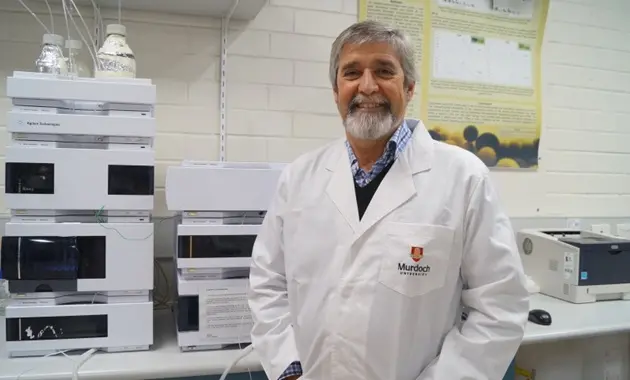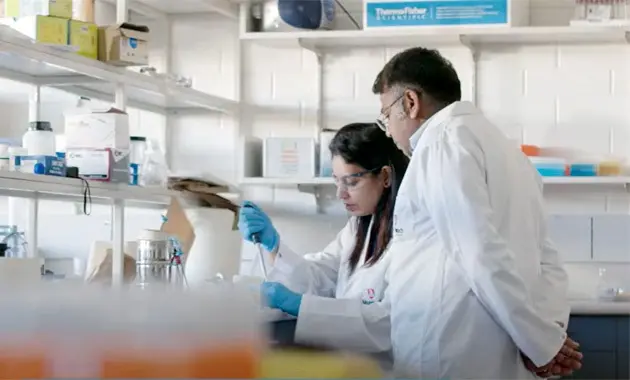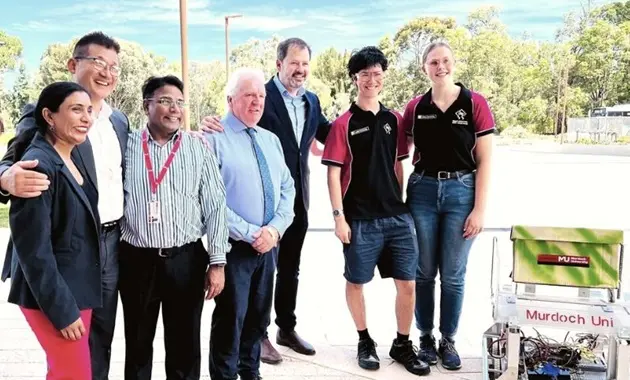The WA State Agricultural Biotechnology Centre (SABC) was founded as a collaborative centre of Murdoch University, The University of Western Australia, and the Department of Agriculture and Fisheries WA (now The Department of Primary Industries and Regional Development or DPIRD) in 1992 at a time when a very limited biotechnology research facilities existed in the Western Australia state of Australia.
Since then, the SABC has continued to grow and attract leading agricultural research scientists and affiliated organisations from Western Australia, including various universities, research organisations and private biotech companies. In 2023, SABC celebrates 30 glorious years of serving the agricultural and veterinary industry in genomics and biotechnology research in Western Australia, particularly with collaborative links across Australia and internationally.

Our people
Meet the people dedicated to ensuring the smooth day-to-day operation of SABC.

Our facilities
Discover the cutting edge facilities which enable our world leading research.

Events
Find out about our events, workshops, conferences and seminars.
Our mission
To provide state-of-the-art facilities and equipment enabling multi-disciplinary research in genomics & biotechnology, which underpins the agricultural and veterinary industry, for the benefit of the community. This will be achieved by being recognised as the Centre for agricultural biotechnology in Western Australia, providing national and international research links and collaborations and fostering the establishment of national centres in leading-edge technologies.
Our vision
To be an eminent, internationally recognised centre for research and development in agricultural and veterinary biotechnology.
What makes SABC unique
The SABC is a collaborative research centre, uniting academics, government, and industry under one roof. It supports agricultural biotech startups, fosters cooperative research, and maintains extensive national and global affiliations.
- The SABC is a multi-user resource centre providing open access to its research facilities.
- The SABC combines university, state government and industry researchers in one cost-effective centre.
- The SABC supports incubation and co-location of new agricultural biotechnology companies in Western Australia.
- The SABC promotes collaborative research, and contract research, and its researchers have many local, national, and international affiliations and connections.
- SABC researchers are members of several agricultural Cooperative Research Centres (CRCs), ARC Centres, research platforms, initiatives, and networks in Australia and beyond.
Training and mentoring
The SABC plays a major role in advanced training in genomics, molecular biology, and biotechnology. It supports research of many Honours and PhD students and provides researchers with expansive research experience. SABC hosts a range of internationally visiting scientists and students for training as part of their PhD and empowers researchers to take up cutting-edge science and technology research.
Our competitive advantages
The SABC's biotechnology research space integrates crop, veterinary, and biomedical studies while fostering valuable partnerships with farmers and industry.
- Combines crop, veterinary and biomedical research in biotechnology in one location.
- Multidisciplinary, collaborative, and inclusive.
- Provides enabling facilities, platform technologies and common laboratories.
- High output and cost effective.
- Provides genetics selection tools for the broadacre and horticultural crops, animal husbandry, livestock industry, and other agricultural commodities of various Australian Research Development Corporations such as Grains Research & Development Corporation (GRDC), Hort Innovation and Meat & Livestock Australia.
- Directly contributing to the Australian farming community and well-connected with notable breeding companies such as Australian Grain Technologies (AGT), Intergrain Pty Ltd., LongReach Plant Breeders, Chickpea Breeding Australia and Grains Innovation Australia.
- Established connections with international agricultural research organisations, research institutes and agencies such as Food and Agriculture Organization (FAO) of the United Nations, International Atomic Energy Agency (IAEA), Australian Centre for International Agricultural Research (ACIAR) , The Crawford Fund, CGIAR centres such as:International Maize and Wheat Improvement Center (CIMMYT), International Crops Research Institute for Semi-Arid Tropics (ICRISAT), International Center for Agricultural Research in Dryland areas (ICARDA), The World Food Prize Foundation, Asia-Pacific Association of Agricultural Research Institution (APAARI), Forum for Agricultural Research in Africa (FARA), West African Centre for Crop Improvement (WAACI) and The University of Ghana.
